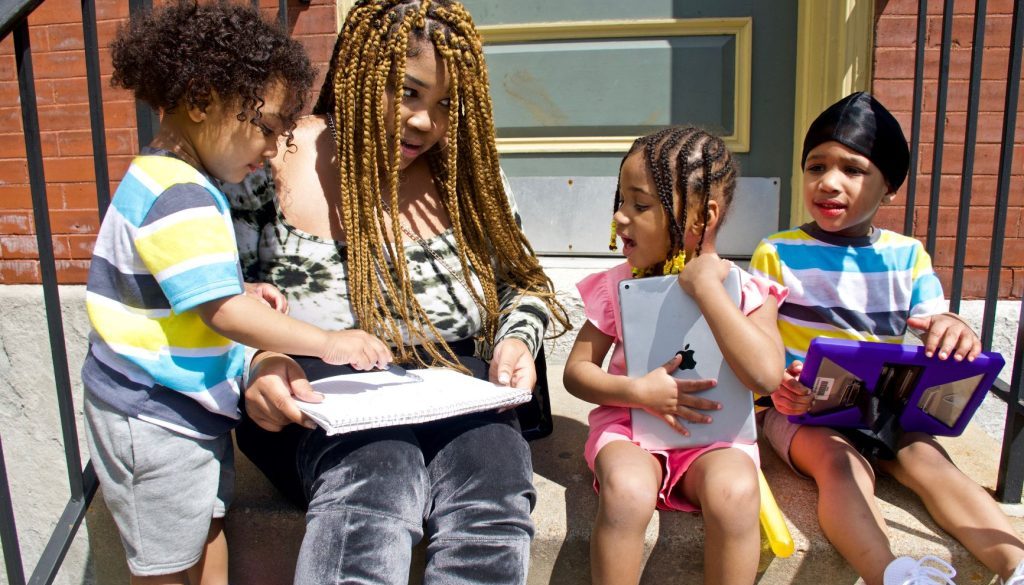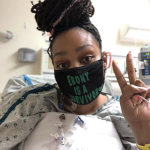Courtnesha Rogers is raising three preschoolers in the shadow of the pandemic
This story is part of the 63106 Project and was produced in partnership with the Pulitzer Center. Additional support was provided by the St. Louis Press Club. This story first appeared in the Riverfront Times on May 11, 2020
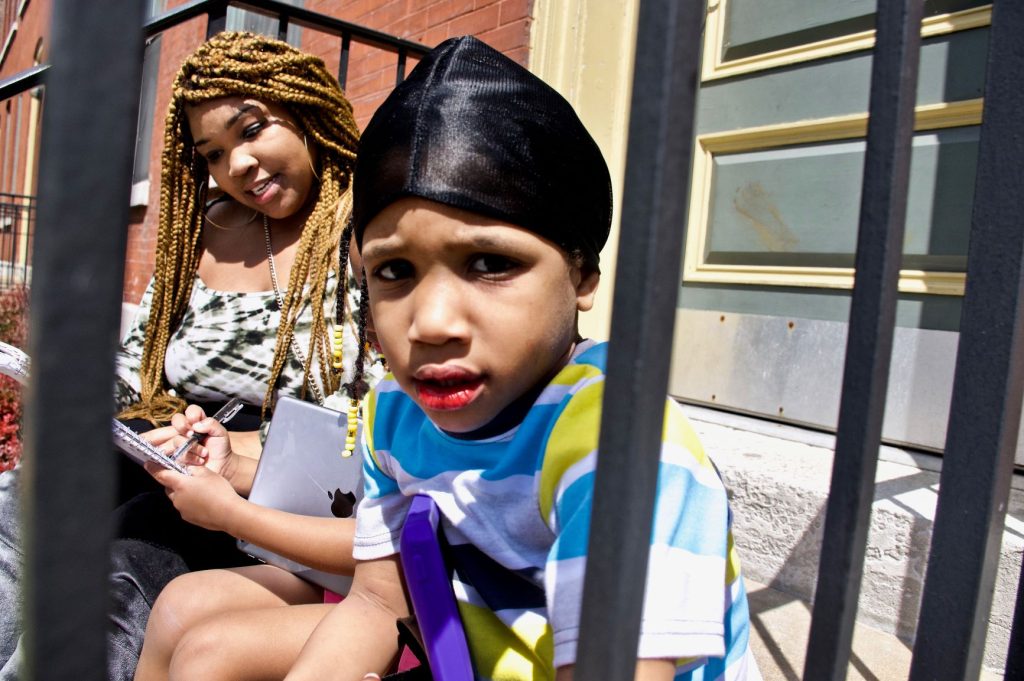
By Jeannette Cooperman
Courtnesha Rogers’ first hint of pandemic was the day she showed up at the Flance Early Learning Center to pick up her daughter, Angele. “Hey, you can’t go any farther,” she heard someone yell. A table with bottles of Germ-X was set up outside, and she had to sanitize her hands before she could enter the building. What? Then she was told she could not bring Angele a My Little Pony cake with four big candles for her birthday.
And then she heard that her father’s best friend had died.
He was 36.
“He got the virus, and he already had a low immune system,” she tells me via Zoom. “He did have a lot of sickness. But my dad was around his friend, so now we’re not really going around my dad. That’s why I’m so scared now — I’m at the peak of being scared. I’m scared of contracting the virus, I’m scared of my kids contracting the virus, and my loved ones — anybody, really.”
She is quarantining in her apartment, near St. Stanislaus Polish Catholic Church, with her three little ones and a friend who just lost her job. Rogers has a cosmetics line but shut down her website “because it’s not essential. We couldn’t sell things from home.” This month she starts a health care administration degree — online, thank God.
Meanwhile, she is trying to keep her kids busy. For Easter, they painted bunny faces. On nice days, she says, “I take them out and let them do chalk on the ground, and bubbles, and we have kites.” On rainy days, they draw or play on their tablets. But they’re scared, too. “It’s really hard to explain to two- and four-year-olds that this is something that is killing people,” Rogers sighs, “and we can’t see our family, and everyone is on ‘shakedown.’ They want to be around people. They don’t understand why they can’t see their friends.”
The school Zoom meetings help — and they’ve been an eye opener. “My kids listen to their teacher better than to me!” she exclaims, laughing. “And you see how smart they are. Angelo has a global developmental delay, but he has gotten so much better. They are pushing him up to regular classes. He just was really behind in speech. Now he knows his colors and shapes and everything.”
After working with the kids herself, Rogers has a profound new appreciation for all teachers: “It’s like, ‘Whoa, we need a lunchtime, like, now!’” Still, teachers get to go home. For a 24-year-old single mom, there’s no break. “I think they get a little tired of me, too!” she remarks. “Sometimes when I don’t let them get their way, they’re like, ‘I want to go to school!’”
When Rogers was younger than they are — two years old — her mother was killed by a drunk driver. “I never really got to meet my mother,” she says, “but people tell me she loved fashion, the way I do. And I have pictures — I look just like her.”
It was Rogers’ father, Courtland, whom she was named for, but she grew up without feeling close to him. “He would drive trucks on the road and leave me at home with his wife, or he’d drop me off at my grandma’s house. She was the one who got us ready for school.”
Rogers made good grades at first, but nobody seemed to care. She hung with the wrong crowd, focused on fun. She was a party girl, she decided. Junior year, she dropped out altogether. She was seventeen. She could get a job and find herself a nice apartment.
“And I did that,” she says. Soon after, though, she and her first real boyfriend moved in together. She was sure she loved him. Now she knows how vulnerable she was, how eager to be loved. “He would take my phone and lock me in the house; once he locked me in a closet. I started studying for my GED when I was pregnant, and he would get so mad, he’d shut off the electricity.” He was jealous, she realized. “He didn’t want me to know more than him or do more than him.”
Rogers did not leave him then; she stayed until after the birth of their next child, a daughter. Then their life together became intolerable. She still sees his family — “his mother, his sister. They never miss a beat of the kids’ lives. He’s just not mentally prepared to be around at this point.” Sensing that was what had sent her back for her GED with the first pregnancy. School now had more obvious advantages, because it could help her earn enough money to take care of herself and her baby. So she signed up for classes at St. Louis Community College – Forest Park and kept studying. “The whole time I was in labor, I was doing practice tests,” she recalls. “I kept saying, ‘I have to pass this thing!’ When my baby was three weeks old, I was not even supposed to be out the bed, and I went and took the test.”
It would have been nice, she thinks now, to have had parents who said, “Why don’t you think about this school?” or “When you go to college …” the way she’d heard her friends’ parents say. When her dad moved the family to Hazelwood, her friends all seemed “rich, with big houses” and parents who cared about the details of their lives. “I was responsible for myself,” she says. “That’s how I just kind of branched out in the world, from myself.”
Rogers and her father get along better now that she’s older, but she never felt like a Courtnesha, so when she set out to make an album and needed a rapper name, she had fun picking one. “I always had a lot of angels around me,” she thought. She would be Angela Sky. “We’re all gonna match,” she told her babies. “We’re the Angel Gang!”
Having children, she says, is what taught her “how to share. How to sacrifice, give up things I wanted. How to cherish moments. And more importantly” — a wide, lit-up smile — “I finally felt loved.”
If Rogers does come down with COVID-19, she’s nervous about what will happen: “I think they will still send you home to fight it. I would have family for my kids to go to, but they won’t know how to be without me. My kids don’t spend the night without me; I’m never away from them for more than six or eight hours. We would have to do this thing together.”
And it would be without insurance, unless she can get her Medicaid back. She had coverage, but it was canceled, “maybe because I was earning too much? So I’ve been paying out of pocket for everything, and it’s killing me. My baby’s asthma medicine alone cost almost $300.” That’s next on her list: reapplying, hopefully online. “I qualified for food stamps, so shouldn’t I be eligible?”
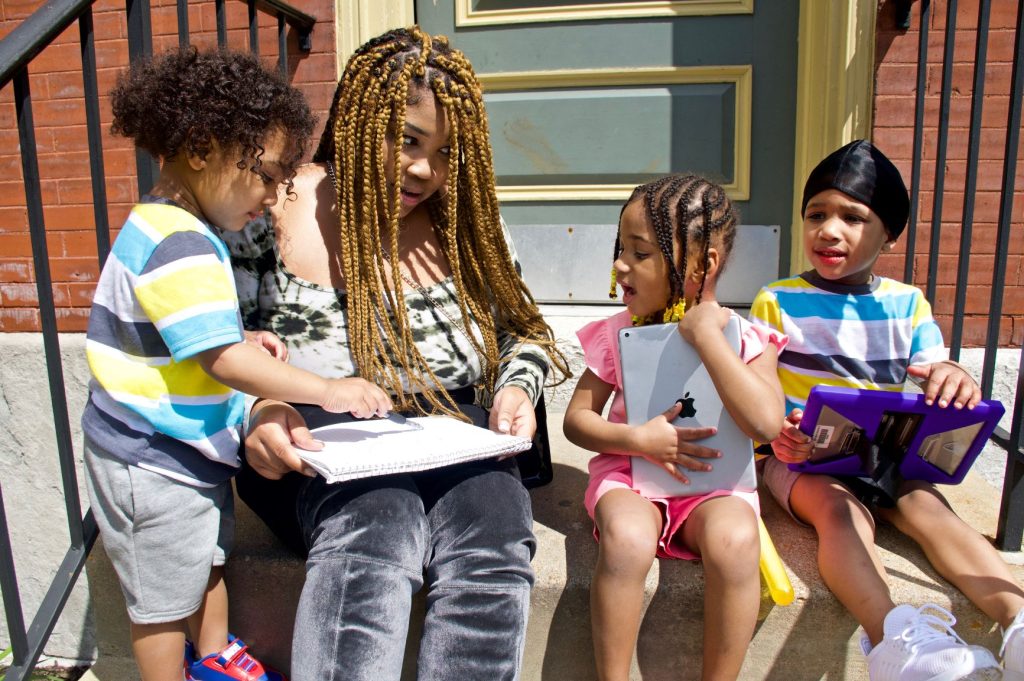
What bothers her most about the pandemic isn’t even these practical, everyday fears, though. It’s that “there is no cure. It’s the scariest thing in this life. I just feel like it’s wiping the world out, like this is what’s going to kill the world, and this makes me so sad.”
Every time she goes to the grocery store, she prays. “I don’t wear gloves, I don’t do any of that, because I just feel like, if that is God’s plan for me, it’s not something I’m going to necessarily try to avoid. I’m just taking it straightforward. If I feel like I have a fever, then I will cover up with a mask, but I haven’t done that. We’ve been going places daily, and we are very healthy. And you can still get it with the mask and the gloves. A lot of people you see still touching their faces and using the same gloves and pulling the mask on and off of their mouths. You can try to be a germ freak and go OCD with this whole thing, but if it wants to strike, it’s going to strike. And if it’s in the air, you have to breathe.”
This is not a new way of thinking, born of the pandemic. “It’s how I live,” she says with a shrug. “I live like that daily.” Before she was able to buy a car, she was “pushing three babies in a stroller down the street, and at night I’d try to get inside fast, before some man could come up.” For courage, she’d remind herself, “If anything is supposed to happen to me, it will happen.” Still, she was scared.
And now she’s even more scared. She knows she lives in 63106, the ZIP code where people’s lives average eighteen years shorter than those of people in 63105 (Clayton). The difference, she figures, is because “there is no hope. There is no money, so that changes hope. You get stressed. There’s a lot of drugs, a lot of alcohol. People turn to different ways to try to survive, and sometimes those ways are horrible.” She pauses to answer Angelino: “It’s a monster! Oh, my!” Then she resumes: “There are programs; the government does eventually reach out. But it’s hard. Say a girl is going to school, and her brother’s in gang violence, and he dies. You just can’t even focus.”
Rogers does focus — she finds every possible opportunity for her kids, and she was just starting to have real dreams for herself. Now, this.
She pulls Angelino close, patting his bottom. “I just want them to find a cure. I feel like, if we can wash our hands with soap and water, they can find a cure! I know we’re against China, but I feel like we really need to pay attention to what China does. First of all, they built a whole hospital for the virus, to contain the virus.” (In fact, they built two in Wuhan alone and more than 30 temporary hospitals.) “And they have been very strict. They have trucks that are sanitizing the air. Here, they had to come close everything down for us to even listen. And the U.S. is spiking numbers higher than where it started!”
What would she say to the nation’s president? “Trump? Bless his heart,” she says, her soft smile hard to read. “Bless his heart. I would just tell him to think about the decisions he’s making for everyone. I’d say, ‘Would you want these same decisions to be made for you and your family?’ The Lysol? I thought that was like something a fifth-grader would say. OK, so now you just really want us to die.” She shakes her head. “I just want to pray for him.”
She thinks reopening is “a horrible idea, because this thing has not been contained. If we are going to reopen now, we should never have closed. It’s only been, like, three weeks, and we have done nothing to get it contained.” It’s not that she loves quarantine, mind you. “I miss being free,” she says, fervent as she’d be in church. “I miss being free, and my kids being able to see their friends and go swimming. I feel like we are caged in, and it’s like if you go outside you are going to die.” She shuttles between being terrified the world is ending and thinking the precautions are obsessive. “I don’t want it to hinder me. If I’m supposed to get the virus, then, ‘God, so be it.’ I don’t want to run from this thing; I don’t want to hide from it. But I also don’t want to not be smart.”
What she did not know, until this interview, is that far more African Americans are being struck down by this virus than whites. (African Americans are dying at 2.7 times the rate for whites, according to data compiled by the APM Research Lab from states reporting by race.) Though Rogers had been cautious, in the back of her head there was always a tiny bit of reassurance: On social media, in the early weeks, she says she saw again and again, “‘Oh, Black people can’t get it.’”
Focus on 63106
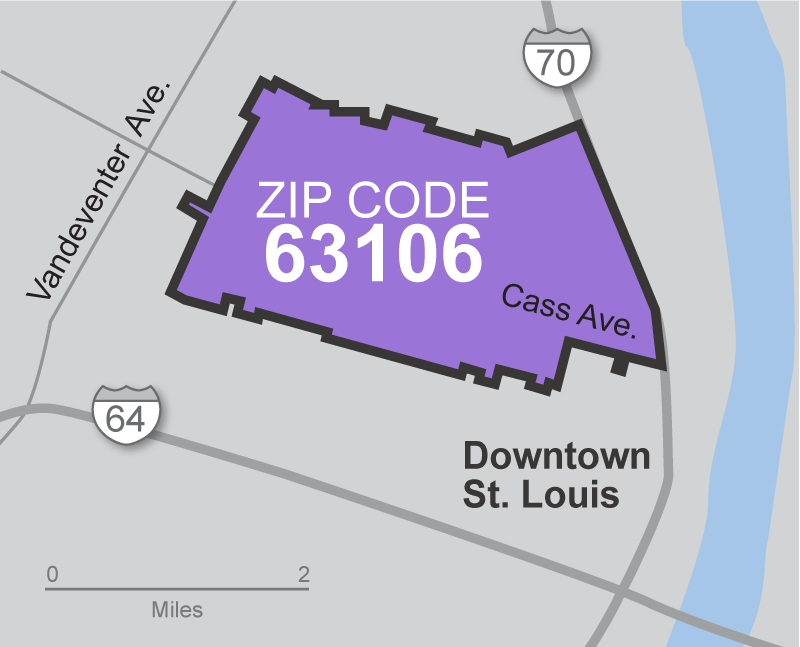
Among a population of 11,221:
50% live below poverty line
45% live without a vehicle
50% live with a disability
- Future home of National Geospatial Intelligence Agency
- Old site of the Pruitt-Igoe housing project, where a small hospital/clinic is promised.
- Several St. Louis Public Schools, including historic Vashon High, the Flance Early Childhood Center, and charter schools.
- Affordable housing developments, including Carr Square Village, Preservation Square, Murphy Park, and Cochran Plaza.
- Numerous churches, including Calvary Missionary Baptist Church, Faith Temple, Progressive Missionary Baptist Church, St. John Missionary Baptist Church, and St. Stanislaus Kostka Church.
About Before Ferguson Beyond Ferguson
Before Ferguson Beyond Ferguson is a nonprofit racial-equity storytelling project that shares the stories of African American families and the challenges they have faced over generations in gaining their purchase on the American Dream. This story, which first appeared in the Riverfront Times, is one of a series on families living in the 63106 zip code amid the pandemic. Readers are invited to find an archive of stories like this one and join the email list for this project by visiting BeforeFergusonBeyondFerguson.org

